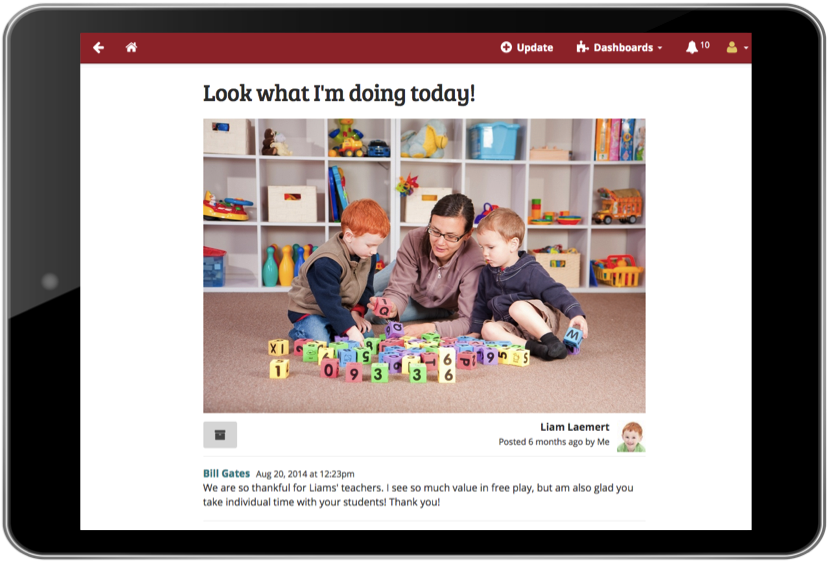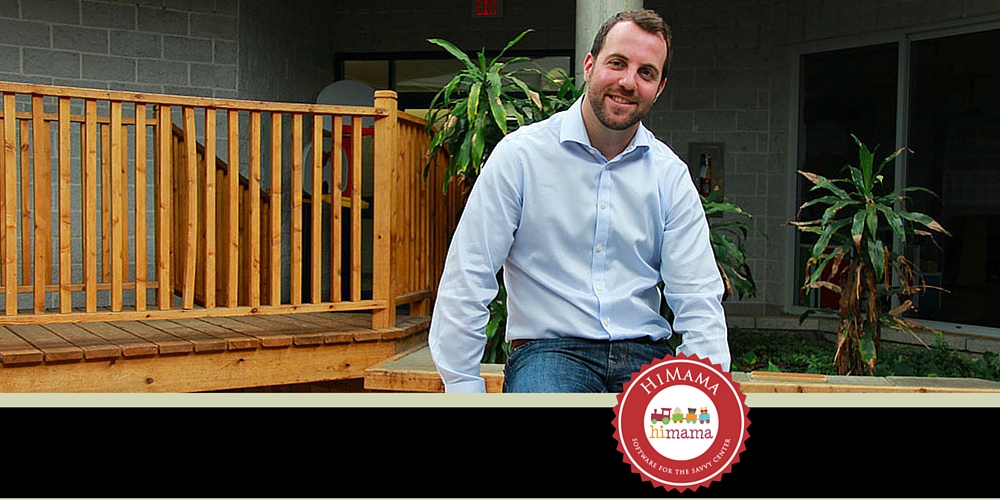HiMama is an educational app for young children – it helps to connect parents and childcare professionals. Using tech to replace the admin, and letting these educators spend more time with the kids.
Q: Please tell us a little bit about your company – what is HiMama all about?
HiMama is an app for daycares that helps connect parents with their children during the work day. It alleviates anxiety for parents dropping off their young children at daycare because it provides a window of transparency into the child’s activities, showing parents the quality of care their child is exposed to. HiMama is valuable to educators because it helps them build relationships with families, gets parents more engaged in their children’s development, and showcases all the important activities they’re doing with the children. Our apps are used by child care professionals and early childhood educators using tablets to record children’s activities and their development. Updates can be shared instantly with parents who get updates through email, text, our website and our mobile apps. 97% of child care and early learning programs said that HiMama makes their programs standout from the competition, and 98% of parents say that HiMama adds to their overall satisfaction with their child care provider.
Q: Please tell us a little bit about your background and how you started your company?
My dream has always been to start my own business. This dream starts with the entrepreneurial roots of my family, with my grandfather who moved to Brazil from the Netherlands to start a farm over 60 years ago. My father then immigrated to Canada over 30 years ago with the intent of starting his own (mushroom) farm, but after a major setback where he was struck by a drunk driver, his dream never became a reality. After this, I knew I would forever regret it if I didn’t start my own business and, more specifically, a business that represented the values my father observed in life, including a passion for learning and a sense of civic duty.
I studied Chemical Engineering at the University of Waterloo, and then went on to get an MBA at Harvard Business School. After a period of time doing corporate consulting, in 2013 I quit my job to start my own business. There was an opportunity cost to leaving my consulting job, but as all entrepreneurs know, there is no perfect time to start a business. My goal was to create a service that benefited society, and I looked into early childhood education as a means of doing so. I learned just how important the early childhood development process is, and I began thinking about how I could leverage new technologies to improve the education process in these formative years. After many networking events and conversations with friends, the concept behind HiMama was born.
Q: What are some of the projects you are working on right now?
One cool project that we’re working on right now is our inaugural benchmarking study of the child care industry in North America. This is a relatively involved project for an early stage startup to take on, but it has been a great opportunity for us to build relationships with CEOs and CFOs of some of the largest child care organizations in the U.S. and Canada. This also provides genuine value for the industry, by publishing a report with data that has never been available to these executives before. We’re hoping to make this an annual report so that we can also provide trend information as well. Another big project we’re working on is a job board for Early Childhood Educators. We’re really excited about this project because it targets high quality job seekers and job posters. By positioning the site as a premium job board, we are supporting the macro trend in the child care sector of professionalizing the role of the Early Childhood Educator. This marks a transition from an environment where the child’s health and well-being is the only concern, to an environment that provides stimulating learning and development opportunities for young children.

Q: What are your plans for the future, how do you plan to grow this company?
I’m really excited about the trend happening in the child care sector where an increasing emphasis is being placed on high quality early childhood education. With learning and development becoming an increasingly important part of child care, there will be a growing number of opportunities for HiMama to offer products and services to support Early Childhood Educators. This puts a greater emphasis on tracking and documenting children’s progress, and also encouraging parent involvement in children’s learning.
I anticipate that the growing push for a more educational focus in child care will also result in increased funding to child care programs to make the necessary investments in support of this change. This will include investments in new technologies and innovations for their programs, including apps like HiMama. With the increasing affordability of mobile devices, such as tablets, this means there is a lot of opportunity for growth in the child care sector.
Q: How do you bring ideas to life?
When first starting HiMama I found that one of the best ways of bringing the product to life, before we had a product, was to tell stories about the specific pain points that the planned app would solve for child care programs. If people can relate to your story, it will get them engaged and interested in the idea.
To move from an idea to a physical product and a business, the key is to take incremental steps forward. Don’t get ahead of yourself or you will quickly become overwhelmed. Instead, only focus on the next step ahead of you. With HiMama, for example, my first customers gave me their credit card to subscribe to the app before we had a product. I just showed them some images I had created in PowerPoint of what it might look like and they were sold. This was a much easier step for me than building an app.
Q: What’s one trend that really excites you?
I think the wearables trend is quite exciting because I feel like we’re at the stage where we’re just scratching the surface of what can be done. The possibilities for the different types of applications are so interesting, not just for consumers, but also for businesses. A lot of focus has been on personal health applications, but I foresee so many other applications in the security and payments space also developing.
Q: What were the top 3 mistakes you made starting your business and what did you learn from it?
The first mistake I made in starting my business was not starting it soon enough! Without a doubt I gained valuable experience working in a business consulting role, but I still wish I had taken the plunge sooner. The learning curve is steep, and the work much more rewarding. There’s no perfect time, so start now.
My second mistake is really an extension of the first mistake. Once I decided to take the leap I should have been a bit more aggressive in some aspects of the business. I recall telling myself early on things like “the product isn’t ready for that sales or marketing campaign yet”, but in hindsight I wish I’d just gone for it. Think about the worst case scenario and I can guarantee you that it’s better than any regrets you’ll have if you didn’t at least go for it.
Finally, there have been a couple times when I went against my gut because people convinced me of an alternative option or path. Every time I have done that it has turned out bad. So the moral of the story is to go with your gut. While getting other people’s opinions is certainly something you should do, don’t let them convince you against your path if you feel strongly about it.
Q: How do you go about marketing your business, and what has been the most successful form of marketing for you?
We use all the modern marketing techniques that most startups would be using. However, we are still in the early days of testing the various marketing channels that we are experimenting with so it is difficult to say which is most successful. The most successful channel may also change over time. For example, I started out with in person interviews with child care providers and this was how I got my first customers. While I knew this wasn’t scalable for the business, it was a great way to get started and not only get those early customers but also learn more about them.
Q: What would you say are the top 3 skills needed to be a successful entrepreneur – and why?
Firstly, all entrepreneurs have at least some level of risk tolerance that is above the average. I know many very smart people that could perhaps be successful in starting their own ventures, but simply don’t have the risk appetite for it. This risk taking also goes beyond just starting the business into many more decisions that you’ll be required to make as you grow the business.
Secondly, successful entrepreneurs are able to make themselves do the tasks that others do not want to do. There are many situations where you have to step out of your comfort zone and do things that most people would either procrastinate over or refuse to do altogether. Successful entrepreneurs tackle hard problems head on.
Finally, successful entrepreneurs are able to execute, day in and day out. It is one thing to have a big vision and decide to start a company, but it is a whole other matter to have the focus, persistence and capability to execute on your vision. It takes hard work and determination.
Q: What are the top 3 online tools and resources you’re currently using to grow your company?
We’re largely sticking to the basics in the department of online tools and resources.
We use Salesforce for our CRM which is a core part of our business. It is used for tracking leads and opportunities, as well as other partners and contacts that we are introduced to both online and offline.
We use Google Analytics extensively for analyzing web traffic, including referrals, user behaviors on HiMama, and many other points of information about people that are hitting our website. In particular, we use it to track the success of our marketing campaigns.
We use MailChimp for our email marketing activities. It’s very easy to use and has all the things you would look for in a mass email service for a small startup. It’s also free for period so is great to start out with as you build your mailing list for your startup.
Q: How can our community get in touch with you?
Email: ron @ himama.com
https://www.linkedin.com/company/himama
Crunchbase: https://www.crunchbase.com/organization/himama#/entity








